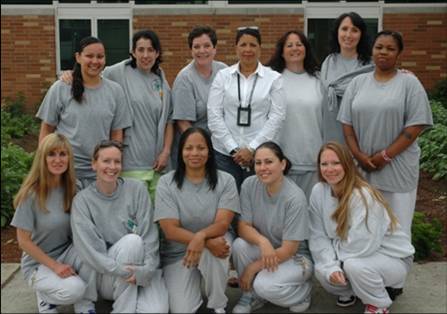By Rowlanda Cawthon, Washington Department of Corrections, East Team Leader, Communications

Associate Superintendent Margaret Gilbert, center, with members of the Women's Village at Washington Corrections Center for Women
Principles behind the mantra, “It takes a village to raise a child,” have been adopted by a group of dedicated offenders at the Washington Corrections Center for Women. Both offenders and staff at the prison wanted to foster a positive community environment and propel women to shift their thinking, so they formed the Women’s Village group to develop an approach that would change the prison culture.
With the cuts to offender programming, the women realized the need to tap existing resources to foster a sense of growth, collaboration and commitment. “The Women’s Village has been a great way for the women to really start thinking about their lives and how they can influence each other,” said Associate Superintendent Margaret Gilbert. “We’ve managed to get some staff on board and we are certain this project can change the culture of the prison.”
The mission of the Women’s Village is, “To encourage and foster an atmosphere of change by harnessing our unique strengths together as individuals and to create a new culture based on the pursuit of personal excellence.” The term Women’s Village was created by Psychology Associate Robert Walker and offenders developed the purpose, values and structure of the program. “The project offers the women a unique opportunity to share their personal experiences and knowledge to inspire each other to change and make positive contributions to the community in which they all live — the prison,” said Walker.
A village council serves the Women’s Village in an advisory and governing capacity to provide leadership and direction. There are ten women on the council who work incredibly hard to create a healthier prison atmosphere. Their criminal backgrounds vary as do their custody levels, but this doesn’t hinder their unified commitment.
Jeannette Murphy who has been incarcerated for 28 years firmly believes that the Women’s Village is a practical resource. “One goal of the village is to keep the women busy,” said Murphy. “If we can help keep the women busy and assist them in finding their passion, we can address problems before they escalate and greatly reduce violence. We can work together to prevent another Jayme Biendl incident from occurring where we live.”
As the project evolved, the women unanimously agreed that they needed to identify their passions and create work opportunities around what genuinely made them happy. This resulted in the formation of nine sub–councils that serve as a means to get women engaged in something bigger than themselves.
- Violence Reduction Team – Responsible for gauging the prison environment and identifying ways to reduce violence.
- Health and Wellness Team – Facilitates wellness classes to include women’s health, nutrition and daily health routines.
- Educational Team – Assist offenders with their educational needs and work with offenders who have learning disabilities to help them achieve their goals.
- Environmental Team – Creates sustainable programs and get women involved in creating a sustainable environment.
- Peer Support Team – Help offenders who need assistance in dealing with the realities of prison life. Peer mentors also work directly with mental health staff.
- Morale Building Team – Bring back a sense of order and respect within the prison by promoting a positive change in the way women deal with their feelings.
- Reentry Team – Facilitates programs that will help with the reentry process including but not limited to job readiness classes, resume workshops and dressing for success.
- Spiritually Team – Gives women a chance to explore a variety of beliefs and become more in tune with their own, whatever they may be.
- Family Support – Facilitates parenting groups, create positive ways to build on family relationships, and host workshops centered on family dynamics.
Each team is lead by a council member who has a sincere passion for the work required. Women interested in the Women’s Village must officially become a village member by participating in three orientations, two accountability circles, and committing to engage in two self–help groups or classes offered at the prison.
The orientations are lead by the council members and staff, and give an overview of the purpose and values of the Women’s Village. The women are also given an opportunity during orientation to develop personal goals that will enable them to create a vision of who they are and who they are becoming. Accountability circles provide the women with an opportunity to meet regularly to discuss issues or problems they are facing, to set goals to address these issues, and to brainstorm ways to accomplish the goals.
“We are a group of women who want more for ourselves and we want the women around us to feel the same way,” said Offender Renee Curtiss. “Having women believe in you and hold you accountable is the key to changing attitudes and behaviors, and that’s what we are all about.”
The values of the program are respect, honesty, compassion, diversity, self–empowerment, education and usefulness. These beliefs have been the driving forces behind the members’ ability to assist offenders in transitioning from intensive management unit to less restrictive custody, developing recycling and gardening programs, and simply getting women to be a source of change for each other within prison walls.
1 Comment:
Delmar Algee
Hello. My name is Delmar Algee and I work at Pierce County Human Services as the Homeless Services Supervisor. Yesterday, our department received a letter from Mrs. Shelley Stark requesting more information about resources; however, there was no contact information on the letter. If you’re interested in learning more about homeless services, it would be my pleasure to assist you. My phone number is (253) 218-3944 and my email address is delmar.algee@piercecountywa.gov. Thank you